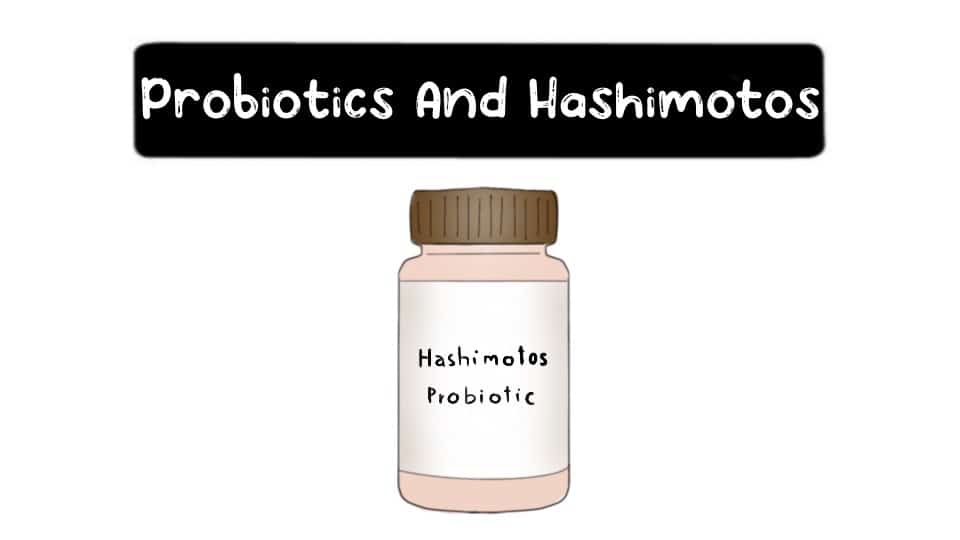Can You Take Probiotics With Hashimoto’s?

You can take probiotics for Hashimoto's but there is no clinical evidence supporting the efficacy of probiotics for people with the disease. High-dose, multi-strain probiotics may be helpful for people with Hashimoto's, especially those with low levels of gut bacteria according to Dr. Izabella Wentz.
Probiotics a type of live microorganisms, have shown positive effects on trace elements like selenium, zinc, and copper, which can be beneficial for thyroid health according to a 2020 study authored by J Knezevic. Hashimoto's thyroiditis is an autoimmune disease characterized by chronic inflammation of the thyroid gland, resulting in hypothyroidism and the production of autoantibodies against thyroid tissue.
What Is Hashimoto's Thyroiditis?
Hashimoto's thyroiditis is the most common form of thyroid problem and is classified as an autoimmune disease by the NIH. It occurs when the body's immune system produces antibodies that attack the cells in the thyroid gland, leading to an underactive thyroid and insufficient production of thyroid hormones. The main cause of Hashimoto's is the immune system's reaction against the thyroid gland, and it is more common in individuals with a family history of thyroid disease.
If left untreated, Hashimoto's can have serious and even life-threatening complications. The disease can be diagnosed through blood tests that measure thyroid-stimulating hormone (TSH) levels and thyroid hormone levels, as well as thyroid autoantibody tests.
While there is no cure for Hashimoto's, it can be managed with appropriate treatment, and medications such as levothyroxine are commonly prescribed according to a 2022 study authored by DL Mincer.
Dietary modifications may also be recommended, including avoiding certain foods. Hashimoto's thyroiditis primarily affects women, and it is characterized by chronic inflammation of the thyroid gland.
Can The Gut Affect Thyroid Health?
Yes, there is a strong connection between gut health and thyroid function. The gut microbiota influences the absorption of minerals important for thyroid function, such as iodine, selenium, zinc, and iron as previously mentioned.
Altered levels of these minerals have been linked to thyroid dysfunction. Poor gut health and imbalances in gut bacteria can impair thyroid function and contribute to inflammation and "leaky gut." Small intestinal bacterial overgrowth (SIBO) has been associated with lower thyroid function.
There is increasing evidence of an interconnected relationship between gut health and thyroid health, particularly in autoimmune thyroid conditions. The gut microbiome plays a role in thyroid hormone metabolism, and a healthy gut microbiome can have a positive influence on thyroid function.
Leaky gut, caused by imbalances and deficiencies in vitamins and minerals, can contribute to thyroid issues. The hormones produced by the thyroid gland directly impact the digestive system, and imbalances in the thyroid can lead to digestive problems. Maintaining a healthy gut is important for optimal thyroid health.
Can SIBO Cause Hashimoto's?
Yes, there is a connection between small intestinal bacterial overgrowth (SIBO) and Hashimoto's disease according to a 2014 study authored by AD Patil.
SIBO, or small intestinal bacterial overgrowth, refers to an excessive growth of bacteria in the small intestine, leading to digestive symptoms and potential systemic effects.
Treating SIBO has been observed to improve symptoms associated with Hashimoto's, such as IBS, restless leg syndrome, low ferritin, low B12 levels, and even reduce thyroid antibodies. It has been found that over 50% of people with hypothyroidism, including Hashimoto's, have SIBO according to AD Patil.
Can Leaky Gut Cause Hashimoto's?
Yes, Patients with Hashimoto's showed increased zonulin concentrations, suggesting the presence of a leaky gut, showing intestinal permeability is compromised in patients with Hashimoto's according to a 2021 study authored by LC de Freitas Cayres.
Zonulin concentrations, when increased, indicate the presence of a leaky gut in patients with Hashimoto's thyroiditis, suggesting compromised intestinal permeability.
Leaky gut, also known as increased intestinal permeability, refers to a condition where the lining of the intestines becomes more permeable than normal, allowing substances such as toxins, bacteria, and undigested food particles to leak into the bloodstream.
Can H Pylori Cause Hashimoto's?
There was no association found between H. pylori infection and Hashimoto's in women according to a 2016 study authored by H Shmuely. The study did not support the hypothesis that H. pylori infection is an environmental risk factor for Hashimoto's.
H. pylori, or Helicobacter pylori, is a type of bacteria that infects the stomach lining and is associated with various digestive conditions, including gastritis and peptic ulcers.
Dr. Sara Mesilhy has a Master’s degree in Gastroenterology and holds a membership with the Royal College of Physicians of the United Kingdom. She completed her Bachelor of Medicine, Bachelor of Surgery (MBBS) at Cairo University and is currently part of the ProbioticReviewGirl medical team.